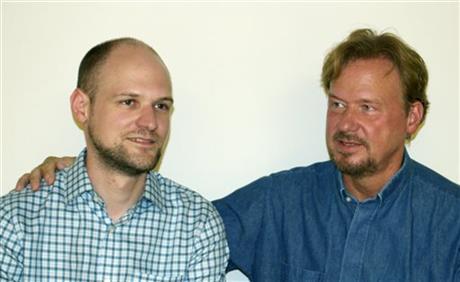
By MICHAEL RUBINKAM
FILE – This Sept. 2013 photo provided by The Rev. Frank Schaefer shows Schaefer, right, and his son Tim. The Rev. Frank Schaefer, 51, charged under United Methodist law with officiating Tim’s same-sex marriage, is scheduled to go on trial Monday, Nov. 18, 2013. The pastor could be defrocked if a jury comprised of fellow Methodist clergy convicts him of breaking his pastoral vows by officiating the 2007 ceremony in Massachusetts. Schaefer’s supporters argue that church teaching on homosexuality is outmoded. (AP Photo/ Schaefer Family, File)
SPRING CITY, Pa. (AP) — A United Methodist minister who officiated at his son’s same-sex wedding pleaded not guilty Monday to charges that he broke his pastoral vows.
The Rev. Frank Schaefer of Lebanon entered his plea at the beginning of a high-profile church trial in southeastern Pennsylvania that is rekindling debate over the denomination’s policy on gay marriage.
Schaefer could face punishment ranging from a reprimand to losing his minister’s credentials if a jury composed of fellow Methodist clergy convicts him of breaking church law that bans clergy from performing same-sex weddings.
The church’s attorney, the Rev. Christopher Fisher, told the 13-member jury in his opening statement that Schaefer clearly violated the Methodist Book of Discipline by presiding over the 2007 ceremony in Massachusetts. He said the complainant — a member of Schaefer’s congregation — was dismayed and shocked when he learned of the ceremony earlier this year.
Schaefer blessed a union that has been “declared by the United Methodist Church to be incompatible with Christian teaching,” said Fisher, echoing the language of the Methodists’ book of law and doctrine.
Schaefer’s attorney, the Rev. Robert Coombe, told the jury that Schaefer had simply extended God’s love to his son.
“It’s important to him to practice in his family what he preached to his congregation,” Coombe said. “He did this wedding as an act of love and not as an act of rebellion.”
Dozens of Schaefer’s supporters held signs and sang hymns outside the trial, which is being held at a Methodist retreat about 60 miles east of his church, wearing rainbow stoles, holding signs and singing hymns.
“I’m in support of the church becoming a new church that welcomes everyone,” said Bunnie Bryant, 64, of West Chester, who was holding a sign that said: “Law or love? Jesus chose love.” She continued, “I question the church’s law trumping a father’s love.”
But a pastor who’s also attending the trial said that it isn’t about gay rights, but rather about Schaefer’s breaking of church law and his pastoral vows.
The Rev. Judy Kehler-Shirey, a retired Methodist minister who has attended Schaefer’s church, said she personally disagrees with the church’s policy on gay marriage but would not officiate at a same-sex wedding.
“I have a vow that is connected to all the other United Methodist pastors internationally. We have a covenant to follow the Discipline whether we agree with it or not,” she said. “That has to take priority.”
The nation’s largest mainline Protestant denomination accepts gay and lesbian members, but it rejects the practice of homosexuality as “incompatible with Christian teaching.”
Schaefer has said he informed his superiors in the Eastern Pennsylvania Conference that he planned to officiate his son’s wedding, and again after the ceremony, which took place at a restaurant near Boston.
He faced no discipline until April — less than a month before the church’s six-year statute of limitations was set to expire — when one of his congregants filed a complaint.
Schaefer could have avoided a trial if he had agreed to never again perform a same-gender wedding, but he declined because three of his four children are gay.
A Methodist trial resembles a secular trial in many ways, with counsel representing each side, a judge and jury, opening statements and closing arguments, and testimony and evidence. Schaefer can appeal a conviction, but neither the church nor the person who brought the charge may appeal an acquittal.



